|
|
|
Sort Order |
|
|
|
Items / Page
|
|
|
|
|
|
|
| Srl | Item |
| 1 |
ID:
077873
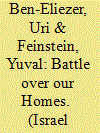

|
|
|
|
|
| Publication |
2007.
|
| Summary/Abstract |
During the Second Intifada, Israel started to construct a separation barrier, officially aimed at preventing Palestinian terrorists from penetrating into its territory. Previous Palestinian attacks caused the death and injury of many innocent civilians, and raised a sense of indignation toward the incompetence of the Israeli government and security forces. The construction of the barrier, however, raised some objections, based on the argument that the barrier was not built on the Green Line (the 1949 Armistice agreement established between Israel and Jordan) and that it both expropriated extensive Palestinian agricultural lands and de facto annexed many of Israel's settlements that had been built in the occupied territories. Tracing the various practices, representations, discourses, and arenas in which the clashes between the state and the Anti-Wall movement have occurred, the article's main argument is that the relative failure of the Anti-Wall activists in their struggle, and the relative success of the state in constructing the Separation Barrier, resulted from the fact that the conflict has become, for both sides, not only a conflict about a barrier and its route, but a struggle over sovereignty and national identity. Under these circumstances, the activists failed in mobilizing the public against "the Wall", whereas the state succeeded in using various discursive and non-discursive sovereign practices, based on arguments such as "security needs", and "the battle over our homes", as a means to accomplish its mission despite the resistance that appeared.
|
|
|
|
|
|
|
|
|
|
|
|
|
|
|
|
| 2 |
ID:
077868
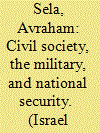

|
|
|
|
|
| Publication |
2007.
|
| Summary/Abstract |
Israel's unilateral withdrawal from south Lebanon in May 2000 was a unique case in which a public campaign led by a grass-roots movement shaped the government's policymaking on national security. That this withdrawal was decided and implemented despite the IDF's reservation and adherence to the quarter-century old concept of a 'security zone' in south Lebanon, further underlines the unprecedented nature of this case in a state where the military institution is a key player in determining the state's security policies. The article explains this case by examining the origins of the 'security zone' concept and the causes for its sustenance and decline along with the changing nature of civil-military relations in Israel since the late 1970s. The article suggests that civil society succeeded in its campaign against the 'security zone' because the concept had been obsolete long before, yet this success must be understood within the context of shifting perceptions and values in the Israeli society toward security and individual sacrifice
|
|
|
|
|
|
|
|
|
|
|
|
|
|
|
|
| 3 |
ID:
077874


|
|
|
|
|
| Publication |
2007.
|
| Summary/Abstract |
This article deals with the debate over the allocation of economic resources to defense in Israel. The article begins with a brief perspective on the definition, size, and history of defense spending in Israel and presents the major participants in the defense budget debate, emphasizing the relative strength of the defense establishment and the Ministry of Finance, and the weakness of other parties. Turning to the debate itself, the major differences bearing on the size of the budget, its structure, and its preparation are analyzed. As focus is turned to recent experience, the growing differences concerning the size of the budget on the background of the aftermath of the recent Intifada and the American invasion of Iraq are described. Finally, the growing uneasiness regarding the defense budget preparation process and, in particular, the unsatisfactory contribution of the civilian sector to this process is discussed. It is argued that this not only the result of defense sector "imperialism", but to a large extent the consequence of the unwillingness of the civilian authorities to accept responsibility and to allocate the resources necessary for serious participation in the process
|
|
|
|
|
|
|
|
|
|
|
|
|
|
|
|
| 4 |
ID:
077871


|
|
|
|
|
| Publication |
2007.
|
| Summary/Abstract |
Since the 1973 War, the secular Ashkenazi middle-class groups, which traditionally had constituted the military's "backbone", have displayed a lack of enthusiasm to continue to bear the military burden, a phenomenon that was publicly portrayed as a "motivation crisis." We conceptualize this process as a shift from a "subjected militarism" that perceived military service as an unconditioned, mandatory national duty to a "contractual militarism," according to which military service is stipulated by the fulfillment of the individual's ambitions and interests, although it remained a formal obligation. Two sites of socializations-school memorial ceremonies and preparation for the military service-serve as mediating mechanisms between the structural, social change and the social agency. Both have been utilized by the dominant groups to re-shape the canon, military ethos in a manner that redefines their relations vis-à-vis the military in contractual terms
|
|
|
|
|
|
|
|
|
|
|
|
|
|
|
|
| 5 |
ID:
077869
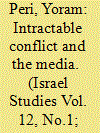

|
|
|
|
|
| Publication |
2007.
|
| Summary/Abstract |
Relations between the media and military affairs, or the media and the security field, have been dramatically altered since 1973 and even more so since the early 1990s. Media outlets have transformed from subservient and deferential into a confrontational model, and the military ceased to be a "sacred cow". If, in the past, the media were only as a tool of the state, they have seemingly also been regarded as reflecting society and individuals. However, a deconstruction of media and news media texts reveals deep structures that have not changed. As in the past, so in contemporary time, the media continue to be a major agent in the development of the Israeli military ethos. They play a significant role in the construction of the image of the enemy (be it the Arabs, the Palestinians, or Gentiles at large). They nourish the positive image of the Jewish hero and of war ethos. They transfix macht (power) values and contribute to the construction of the gender structure of Israeli society. Eventually they nourish the aspired model of a warring society. Therefore, as research of civil military relations in Israel historically focused on the modes by which the media assisted the survival of a besieged society under conditions of prolonged war, while keeping its democratic spirit, this chapter will demonstrate how the media restrained the development of civilian ethos and impeded the development of a post-war society in spite of the accelerating decolonization process
|
|
|
|
|
|
|
|
|
|
|
|
|
|
|
|
| 6 |
ID:
077867


|
|
|
| 7 |
ID:
077872
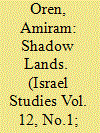

|
|
|
|
|
| Publication |
2007.
|
| Summary/Abstract |
The Israeli security system has possession of and influences in different forms more than half (!) of the territory of the State, excluding the West Bank. It also dictates the uses of air space and most sea space. Territorially speaking, the security system acts as an "independent system" operating alongside, and at times even separately from, the civilian sector. However, it is odd that little attention is paid to its conduct and, in particular, to its reciprocal relations with the civilian system. Consequently there are very few issues pertaining to the use of land resources for security needs and its implications that have come up for academic-research discussion or professional clarification or public debate. This article presents the reasons for this and offers a new agenda for the subject
|
|
|
|
|
|
|
|
|
|
|
|
|
|
|
|
| 8 |
ID:
077866
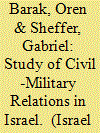

|
|
|
|
|
| Publication |
2007.
|
| Summary/Abstract |
The aim of the article is threefold: first, to define and examine the major approaches to the study of the relationship between Israel's security sector and civilian realms (political, social, economic, and discursive), which we refer to as the "traditional," "critical" and "new critical" approaches; second, to emphasize the theoretical and empirical "gaps" that exist in the scholarly treatment of the relationships between actors operating within both types of spheres, and particularly with regard to the more informal aspects of their interplay; finally, to suggest ways to overcome the lack of adequate treatment of these highly informal exchanges by employing insights from the expanding literature on policy networks and social networks and demonstrating how these networks, which can be identified in the Israeli case, influence general and concrete policymaking on both the national and local levels
|
|
|
|
|
|
|
|
|
|
|
|
|
|
|
|
| 9 |
ID:
077870


|
|
|
|
|
| Publication |
2007.
|
| Summary/Abstract |
Recent years have witnessed a significant rise in the numbers of "national religious" soldiers in IDF combat units. As a result, their sociological and cultural profile has become a matter of considerable public and academic interest. Particular attention has been focused on the strains that might be placed on the military loyalties of national religious troops, should they be required to carry out missions that they interpret as being contrary to Jewish religious teachings. In this context, their behavior when confronted with orders to dismantle Jewish settlements in the occupied territories is generally considered to constitute the litmus test of their allegiance. The article contends that national religious soldiers in the IDF do indeed often sense a conflict of loyalties between their military duties and their Jewish religious obligations. Research indicates, however, that such tensions cannot be attributed solely, or even mainly, to factors associated with their commitment to possession of the Holy Land. The article argues that the principal sources of tension between religious observance and military service in Israel lie elsewhere: in matters of an essentially ritual and behavioral dimension. From that perspective, the almost complete absence of conscientious objection on the part of national-religious IDF troops during the 2005 disengagement from the Gaza Strip and northern Samaria was by no means an aberration. The article is based on both in-depth interviews and on a reading of primary materials, including published epistolary exchanges between soldiers and their rabbis.
|
|
|
|
|
|
|
|
|
|
|
|
|
|
|
|
|
|
|
|
|